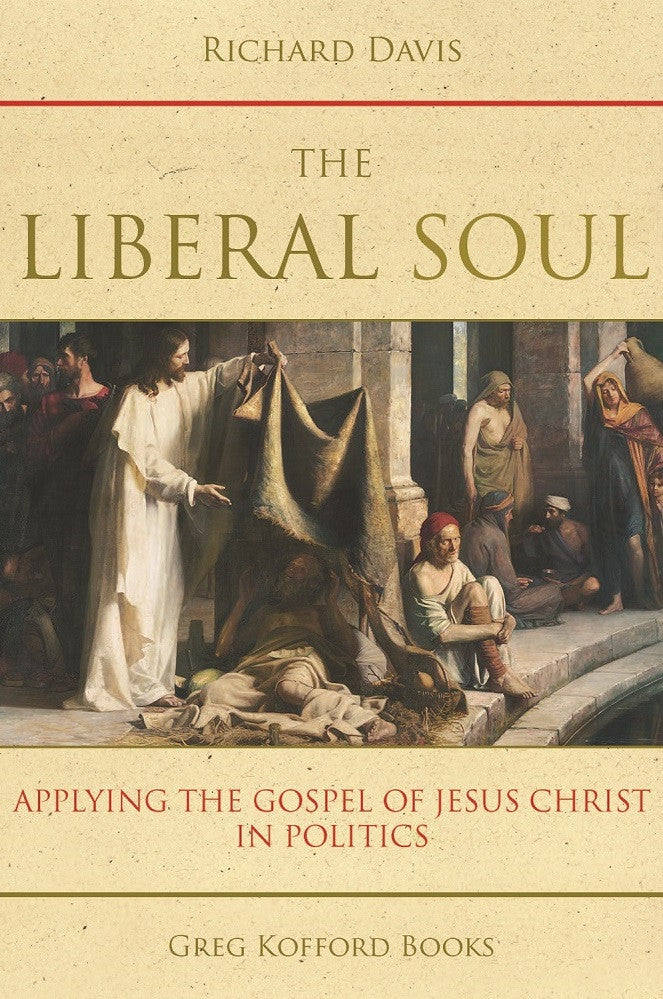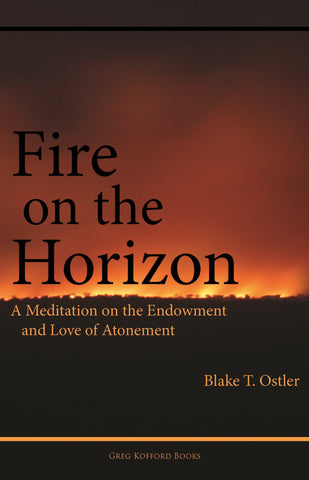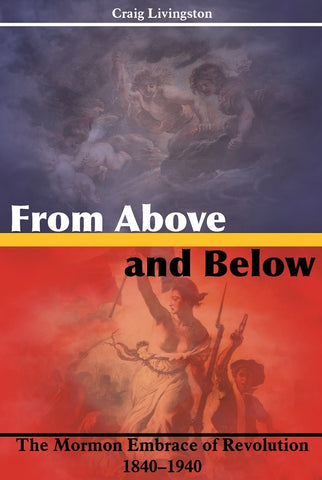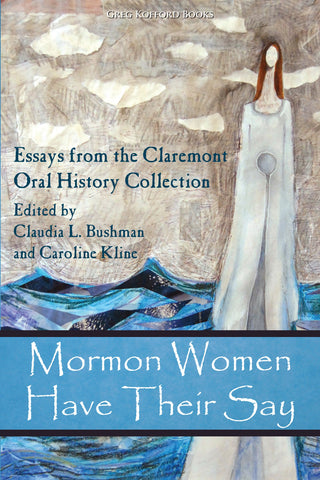The Liberal Soul: Applying the Gospel of Jesus Christ in Politics
$22.95
- “A thoughtful exploration into the principles of generosity, equality, and Christian discipleship and their important relationship to democratic government.” — U.S. Senate Majority Leader Harry Reid
- “How persuasive is the reading Davis puts forward? I would say ‘very much so.’” — By Common Consent


Available in ebook for your Kindle, Nook, Kobo, and Apple.
Also available through Amazon and Deseret Book.
Download a free sample preview.
Book Description:
The Liberal Soul offers something lacking in LDS culture. That is the presentation of a different way for Latter-day Saints to examine the question of how to be faithful disciples of Christ and good citizens. It shows public policy decision-making regarding government role as the manifestation of the “liberal soul” rather than as the libertarianism advocated by past Mormon speakers and writers such as Ezra Taft Benson, Cleon Skousen, or Vern Andersen. It also takes a different approach from the less radical but still traditional economic conservative attitudes of well-known politicians such as Orrin Hatch or Mitt Romney.
Davis suggests that a Latter-day Saint can approach economic policy, war, the environment, and social issues with the perspective that society is basically good and not evil, tolerance and forbearance are desirable qualities instead of bad ones, and that government can and does play a positive role as a vehicle of society in improving the lives of citizens. He describes how Latter-day Saints can apply the Gospel of Jesus Christ to our roles at each of these three levels—individual, group, and society—rather than assuming the societal level violates the principles of the Gospel. The result is that Latter-day Saints can help bring about a Zion society—one where all benefit, the most vulnerable are aided and not ignored, inclusion is the rule and not the exception, and suspicion and fear are replaced by love and acceptance.
Comprehensive Table of Contents:
.
Introduction
Liberal or Conservative?
The Liberal Soul
The Liberal Soul, Society, and Government
The Purpose of This Book
1. Government Is Ordained of God
Isn’t Government Bad?
A One-Sided Political Discussion
Does the Church Prefer a Certain Type of Government?
Do All Governments Do Good?
What Type of Government Benefits Human Beings?
Government as the Tool of the Good Society
Aren’t Individuals Better at Providing Services Than Government?
How Can We Get Beneficial Rather Than Harmful Government?
The Proper Role of Government
2. You Are to be Equal
Economic Equality: “And You Are to be Equal”
The Government’s Role
Social Equality
Legal Equality
Political Equality
Spiritual Equality
3. The Poor Always Have Ye with You
The Individual and the Poor
The Church’s Fourth Mission
Government Welfare and Church Welfare
Should People Be Compelled to Do Good?
The Intersection of Church and Government
Isn’t Government Social Welfare Wasteful?
What Government Can Do
Government Is “the Enemy”—Until You Need a Friend
4. Mingling Religious Influence with Civil Government
Religion and the U.S. Constitution
The Framers and Religion
The Liberal Soul and Separation of Church and State
Separation: Benefits for Government
Separation: Benefits for the Believer
Separation and Religious Influence in Government
The Challenge for the Liberal Soul
5. “The Earth Is the Lord’s, and the Fulness Thereof”
The War over the Environment
Church Leaders’ Calls for Stewardship
What Should the Liberal Soul Do?
Conclusion
6. Thou Shalt Not Kill
Why War?
The Liberal Soul and War
Justifications for War
The Liberal Soul at War
The Liberal Soul, Globalization, and the Role of the United States
“Nor Do Anything like Unto It”
Conclusion
7. If Ye Are Not One Ye Are Not Mine
Becoming One
Forming Political Parties among Members
Political Party Diversity
Avoid Rigid Views
Be Willing to Compromise
See Diversity in the Church
Conclusion
Conclusion: Go, and Do Thou Likewise
Make the Difference
The Liberal Soul Shall Be “Made Fat”
Index
Q&A with the Author:
.
Q: What initially motivated you to write this book?
The one-sided nature of the existing literature on the restored Gospel and politics. LDS Church members easily could reach the conclusion there is only a limited range of thought possible for members on this subject and that is a range between the economic conservatism advocated by people like Orrin Hatch and Mitt Romney and the economic libertarianism promoted by people like President Ezra Taft Benson, Cleon Skousen, and Glenn Beck.
I believe there is a third option - a view that the government can and does play a positive role (although neither the exclusive nor even the primary one) in helping bring about the type of society we all desire. That is my main point in the book.
Q: You have been actively involved in politics. How has your experience as both a political scientist and a political activist shaped the approach you take in the book?
My experience in practical politics, particularly in Utah County, has given me insights into the thinking of LDS voters about politics and the Gospel. That helped me understand their perspective in writing the book and attempting to address some misperceptions about what constitutes Church doctrine and what actually is personal opinion.
Q: Besides the fact that the book argues for a progressive Gospel-based politics, there are also some important rhetorical differences between The Liberal Soul and other LDS books on the subject. In particular, you are making an argument about a political vision that can find support in Gospel principles, rather than arguing that the Gospel demands a particular politics. Why the different approach?
I do not like the dogmatic approaches that characterize politics today generally. I think it particularly doesn't fit in the LDS Church since we seek to be inclusive rather than exclusive. It is not my intent to suggest that people who think differently don't belong in the Church or are somehow less faithful. There are already too many people who think that way. Rather, I want to help members who may believe that to understand that those who sit in the pews with them but think differently than they do on politics come at their views from a Gospel perspective as well.
Q: Is this a book primarily for liberal or conservative Mormons?
It is for LDS people generally, regardless of ideological label.
Q: Do you have any future plans, either in politics or for future book projects?
I intend to stay involved in attempting to make my community a better place and to encourage more engagement by others. I have been involved in the creation of a new Office of Civic Engagement at BYU, which seeks to stimulate civic engagement among BYU students. Additionally, I am part of the effort to create the Utah Debate Commission, which is a new group dedicated to hosting and televising candidate debates in Utah at the statewide and federal level. What I do beyond that in terms of local activism is still to be determined.
Praise for The Liberal Soul:
“Richard Davis searches the scriptures to indicate the many times that Christ and prophets urge us to be “the liberal soul” when dealing with individuals and society. Suffering and need are obvious to everyone, but applying these scriptures to the value of good government brings a new dimension to its importance—both to citizens of this country and, more importantly, to the world. In this election season, with so many critical issues to be considered for our state, nation, and the world, it is important for every individual to understand the reason for government and be willing to make choices based on the premise that “governments were instituted of God . . . for the good and safety of society” (D&C 134:1).” — Former Utah Governor Olene S. Walker
“Davis provides a thoughtful exploration into the principles of generosity, equality, and Christian discipleship and their important relationship to democratic government. This book clearly explains the strong connection between liberalism and Mormonism. I would recommend it to anyone who has ever asked me, ‘How can you be a Democrat and a Mormon?’” — U.S. Senate Majority Leader Harry Reid
“During my years as a Democratic activist I was asked by fellow Mormons how I could be a Mormon and a Democrat. Once I was elected to Congress I was asked by other Democrats how I could be a Democrat and a Mormon. Finally, Professor Davis’s book The Liberal Soul has built a strong case based on gospel tenets to support a more progressive agenda and will begin the process of dismantling the notion that a ‘good’ Mormon must be a Republican.” — Former Congressman Richard Stallings (D-Idaho 2 1985–1993)
“The Liberal Soul is an eye-opening read, providing significant insight into the all-encompassing nature of the gospel of Jesus Christ. Each unique chapter enhances our understanding of the inclusive mission of the Savior, through modern and ancient examples, leading to a greater increase of true discipleship.” — Scott N Howell, Utah State Senate Minority Leader (1992-2000) and 2012 Candidate for United States Senate
“Whether or not one chooses to change his or her political viewpoint to match Davis’ ideal, in studying The Liberal Soul, readers can learn about another place from which to approach politics as a member of the LDS Church.” — Karen Schwarze, Mormon Times
“If you’re a Mormon conservative who wonders how a faithful Mormon can be liberal, The Liberal Soul is worth reading. I hope you will read it, and I hope it will educate you, challenge you, and, especially, inspire you to greater charity for those who disagree with you. I just hope, in the end, it won’t persuade you.” — Alan Hurst, Patheos
“The Liberal Soul is an attempt to put forward a reading of Christianity’s call to generosity which suggests that collective political action towards greater economic and social equality and welfare is as legitimate a response as any other. How persuasive is the reading Davis puts forward? I would say ‘very much so.’” — Russell Fox, By Common Consent
About the Author:

More Information:
198 Pages
ISBN 978-1-58958-583-6 (paperback)
Published September 2014






Share this item: